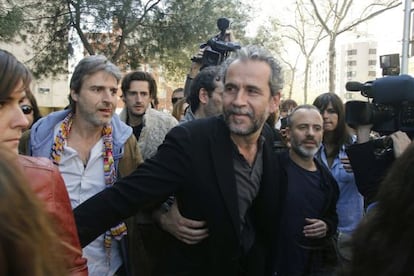The arrest of actor Willy Toledo: Protestors, prisons and seven key facts
Confusion surrounds the activist's detention in the wake of the general strike


What happened on March 29 at La Colonia de San Lorenzo bar in Madrid's Lavapiés neighborhood? Did the actor Willy Toledo encourage a group of picketers to trash the joint, which was open despite the general strike? Was it proportionate to arrest him almost 24 hours after the facts? And what happened that night in jail? At the moment there are two opposing versions: that of Toledo, who denies having anything to do with the violence; and that of the owner of the bar, who insists Toledo was the ringleader of the attack. But the sum of the two versions is not necessarily the truth, and only a few facts have been confirmed...
1. The initial information in the press about the actor's arrest was false - only later did it actually become true. Toledo was detained almost 12 hours after the strikers arrived at the bar, well after information attributed to either the police or Interior Ministry sources said that he had been in custody from 6am. The arrest was carefully thought out by police after the media and social networks had been discussing his detention - or otherwise - all day.
2. The owner of the bar, Rafael Contreras, issued a complaint against Toledo and a group of unidentified people. Contreras says he did not previously know Toledo, but some of his customers told him the actor was leading the picket. Later at police headquarters he identified the actor in a photo.
3. There was rowing in the bar and a group of people from the picket entered in order to force it to close. This much seems clear, according to witnesses. But how much damage was there? Local resident Mohamed El Morabet was inside the bar when the events occurred. He came out onto the street when the picket arrived at around 12.30am. It was a big group of around 50 people. Around eight went inside to intimidate the owner, painting the word "strikebreaker" on the front, kicking chairs and tables, using the fire extinguishers and pulling down the blinds. But the owner said in his statement that they broke "chairs, tables, crockery and the beer taps." These breakages were not proven before the judge. The next day, the bar was in a perfect state.
4. Toledo was in Lavapiés picketing that night. But what was his role? The bar owner told EL PAÍS that the actor encouraged the violence. But when asked if that was inside or outside the bar, he got angry, feeling that his version was being questioned and didn't reply. Local Mohamed says Toledo did not enter the bar at any point and that he didn't see him carry out any aggressive actions.
5. The actor spent the night in a cell. The police decided to keep him in custody until the next day, when he was sent before a judge.
6. The judge said the prosecutor's "disproportionate" request for a provisional prison sentence did not make sense and that there was no proof of any wrongdoing.
7. The case remains under investigation. Since his arrest, thousands of comments have been written about Toledo, both for and against, depending on people's sympathy for, or hostility toward, his political activism. The justice system will now have to straighten it out with the only thing that counts under the rule of law: proof.
"Never in my life, under any circumstances, have I committed any violence"
Guillermo "Willy" Toledo has not only been receiving favorable reviews for his role in Harold Pinter's play The Dumb Waiter recently. He's also been getting a few scares, such as on the day of the general strike when, after forming part of a picket, he was accused of attacking a bar in Madrid's Lavapiés neighborhood and arrested. The actor, who found fame on TV, in movies and the theater, is now in Colombia, and is speaking for the first time about his night in the cells.
Question. The actors union says you suffered a "public and arranged lynching." What is your opinion?
Answer. We live trapped in a criminal system that they call democracy. Those of us who fight against it, in search of a free and equal society, are persecuted like criminals. There were millions of us before today, there are millions today and there will be tomorrow. [...] Then there are those of us who, circumstances being what they are, are well known: we are also subjected to media lynching. The interests of the press are identical to those of those who govern us, they go hand in hand.
Q. What happened the night the general strike started?
A. I went out onto the street at midnight to join up with a picket providing information in Madrid. Our actions were mainly directed at customers of open establishments, so they wouldn't collaborate with them. Never in my life, under any circumstances, have I committed any violence against anything or anybody. Nor did I that night, though I spent nine hours in a cell.
Q. What conclusion did you come to when the news of your arrest hit the press 12 hours before it happened?
A. It's all a bit murky. Days afterwards, and through the information that I have, I have come to a conclusion that, for now, I am keeping to myself. As for the bar owner, I think he has been used. He's also a victim.
Q. He accused you of attacking the authorities, death threats and disorder. But the judge's decision declares that "in no way do sufficient indications of the committing of a crime exist," and the damages are unproven. Why do you think the public prosecutor asked for prison?
A. The public prosecutor's criteria are usually those of the state. Repression and violence in the face of peaceful dissidence.
Q. What did you think the night that you were held?
A. I was locked up for nine hours in a 15-square-meter cell in Plaza de Castilla with 22 other people. Two were labor union members; the rest, ordinary criminals. Others, who had not committed any crime, were there simply because they hadn't been born in Spain. This is democracy. All of them were young, the vast majority foreigners. All poor. All cannon fodder. That is what the system has ready for them: repression, violence, invisibility, prison. I offer them an embrace: they suffer a present much harder than mine.
Q. Has it been important to you that your fellow actors have responded?
A. Very important, but defending our rights together was even more so. We have reached a very high percentage of unemployment. All of us together: technicians, writers, extras, dubbing artists, actresses...
Q. What situations are people working in the theater seeing in Spain?
A. Difficult ones, almost unbearable for the majority. And it will be worse if we don't move to avoid it. The first enemy of those who work to build a system as alienating as this is culture. They seek to create a society of uncritical consumers and the theater contributes to combating that reality.
Tu suscripción se está usando en otro dispositivo
¿Quieres añadir otro usuario a tu suscripción?
Si continúas leyendo en este dispositivo, no se podrá leer en el otro.
FlechaTu suscripción se está usando en otro dispositivo y solo puedes acceder a EL PAÍS desde un dispositivo a la vez.
Si quieres compartir tu cuenta, cambia tu suscripción a la modalidad Premium, así podrás añadir otro usuario. Cada uno accederá con su propia cuenta de email, lo que os permitirá personalizar vuestra experiencia en EL PAÍS.
¿Tienes una suscripción de empresa? Accede aquí para contratar más cuentas.
En el caso de no saber quién está usando tu cuenta, te recomendamos cambiar tu contraseña aquí.
Si decides continuar compartiendo tu cuenta, este mensaje se mostrará en tu dispositivo y en el de la otra persona que está usando tu cuenta de forma indefinida, afectando a tu experiencia de lectura. Puedes consultar aquí los términos y condiciones de la suscripción digital.








































